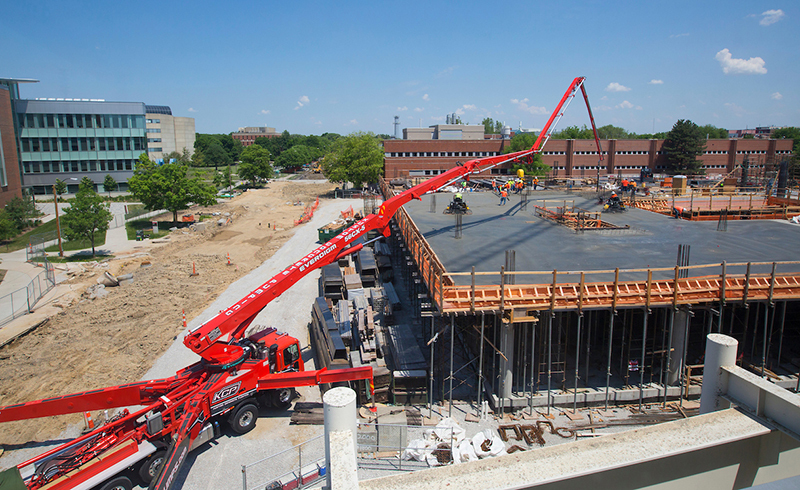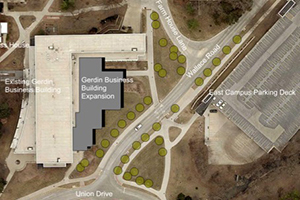Second floor

Photos by Christopher Gannon.
Work continues on Iowa State's $84 million Student Innovation Center on the west side of campus. (Top) Earlier this week, a crew was pouring concrete for the second floor. Framing the construction site is Sweeney Hall to north and to the west, Bissell Road, torn up in sections this summer for multiple utility projects. (Below) Crew members used a variety of methods -- from a long 2x4 on a rope to a hovercraft-like riding trowel -- to smooth the floor surface.

FY19 salaries set for 1 percent increase across the board
All Iowa State employees with satisfactory performance reviews will receive at least a 1 percent raise in fiscal year 2019, under proposed salary guidelines released last week.
"Merit pay increases are critically important to recognize our faculty and staff who work hard every day to provide an exceptional experience for our students and advance excellence in our academic, research and extension programs," President Wendy Wintersteen said. "Competitive salaries will continue to be a high priority as we compete nationally to retain and recruit the best faculty and staff."
The FY19 salary proposal, detailed May 25 in a memo from senior vice presidents to budget leaders, calls for an across-the-board 1 percent pay increase effective July 1 for faculty, professional and scientific staff, contract staff and post-doctoral researchers. Raises up to 10 percent can be provided for extraordinary performance, retention and adjustments based on market rates or equity. Any pay increase greater than 10 percent requires approval from a senior vice president.
Allocated funds for institutional administrative costs -- academic administration and support, business services, facilities services, IT services, library services and student services -- will receive new funding to cover a 1 percent salary hike. All other units will use their own resources to pay for raises. All units must use reallocations to fund any increase beyond 1 percent. Tuition increases, set to be approved at the June 7 state Board of Regents meeting, will provide an estimated $10 million in new revenue in FY19, according to the memo. Salary increases must be entered in the online budget system by June 7.
The proposal's parameters, as required by the university's salary adjustments policy, apply to all fund sources, including positions supported entirely by grants. It excludes Ames Lab employees, whose salaries are set by federal guidelines. The regents board's executive director would need to sign off on the proposal, under a plan set for the board's approval at next week's meeting.
Employees with unsatisfactory performance will be placed on an improvement plan. Those who satisfy the requirements of the plan are eligible for a 1 percent increase in January. Employees hired after May 1 aren't eligible for an FY19 raise.
Merit staff increase
Under the second year of a two-year collective bargaining agreement, merit employees also will receive a 1 percent raise on July 1. At their meeting next week, regents will consider a board staff recommendation to give merit employees no additional performance-based step increases in FY19.
Changes to a state collective bargaining law made in 2017 allow the board to determine whether to provide step increases, which previously were given to all merit employees with satisfactory performance on the anniversary of their start date. Iowa State recommended no step increases, to ensure all employee groups received a similar base raise.
Other changes
The salary matrix for P&S staff will remain unchanged for FY19. However, in a provision new this year, P&S staff making the maximum for their pay grade range will receive an amount equal to 1 percent of their salary in a one-time payment. If a 1 percent raise would boost a P&S worker's salary past the maximum, their salary will increase to the cap and they will receive a one-time payment equal to any portion of the raise not applied to their base salary.
The FY19 parameters also add $50 to each of the salary increases that accompany faculty promotions, which are separate from raises for performance, retention, or market and equity considerations. Those new incremental increases are as follows:
|
Promotion |
Salary increase |
|
Distinguished Professor |
$7,050 |
|
University Professor |
$6,550 |
|
Morrill Professor |
$6,550 |
|
Full professor |
$6,050 |
|
Associate professor |
$5,050 |
|
Term faculty, second level (clinical professor) |
$2,550 |
|
Term faculty, first level (senior lecturer, clinical associate professor) |
$2,250 |
P&S class/comp implementation window shifts with Workday
The implementation date for changes to the professional and scientific classification/compensation structure has been moved from spring to September 2019. The new date will allow staff in university human resources to implement changes to the P&S structure in just one system -- Workday -- rather than duplicate their efforts in the current systems for temporary use.
In March, interim vice president and chief information officer Kristen Constant announced a revised implementation timeline for the first Workday platforms, to July 2019.
"One of our goals had been to implement the classification and pay structure changes one time, taking advantage of the benefits Workday provides while allowing a stabilization period for Workday," said classification and compensation director Emma Mallarino Houghton. "We still believe this is the best scenario, so moving our implementation target preserves that option."
In an update to the Professional and Scientific Council May 24, she said two other options were considered but ultimately discarded: go live on the original timeline in the current system or at the same time as Workday.
Waiting to synchronize with Workday should create some training efficiencies and eliminate the demand for retraining, she said. It also should help minimize confusion inherent with changes to practices and procedures.
Mallarino Houghton said the classification/compensation core team -- UHR staff and consultants -- will continue its work on the project at nearly the same pace. That includes involving partners such as the extended project team, university leaders, HR liaisons and the P&S Council. Their involvement, in addition to helping reach project milestones, validates the process, she said.
Over the next few months, the core team will focus on:
- Identifying titles
- Benchmarking those titles to a third-party salary survey
- Developing title descriptions
- Beginning to build the new structure of titles and pay grades
The team will update the university community as information is available. Mallarino Houghton said units should continue to process employee reclassifications and requests for new positions.
For more information, visit the classification and compensation review website. Questions may be submitted on the website or via email to uhrcc@iastate.edu.
Related stories
- New P&S pay and classification system may wait for Workday, March 22, 2018
- An update on the P&S class/comp review project, Sept. 14, 2017
- University to collect job information from P&S employees, May 18, 2017
- University kicks off review of P&S classification/compensation structure, May 4, 2017
Tuition increase set for final approval
Iowa State would receive $3.15 million in new state support next year -- identical to the University of Iowa -- in a proposed allocation the state Board of Regents will be asked to approve June 7 when it meets in Cedar Falls. The University of Northern Iowa would receive the remaining $2 million of a new $8.3 million appropriation to the three schools. The board's proposal stipulates that the funds be used for resident undergraduate financial aid.
The universities' request to the 2018 Legislature was $12 million for in-state undergraduate aid; $5 million each for ISU and Iowa, and $2 million for UNI.
The $8.3 million is shy of restoring a $10.9 million fourth-quarter reversion shared by ISU and Iowa this spring and made permanent in the state budget for fiscal year 2019. General operating state support for Iowa State on July 1 -- including the financial aid support -- will total $170.6 million, down from $172.9 million last July.
Gov. Kim Reynolds has not signed the education appropriations bill yet.
2018-19 tuition rates
The board will approve tuition and fees for the year that begins with fall semester. In spite of the reduction in state support next year, Iowa State's tuition proposal remains the same as outlined in April: A 3.8 percent tuition increase ($284 for the year) for resident undergraduates and 4 percent for all others, including veterinary medicine students. It includes two other pieces:
- The final year of a three-phase, $542 annual tuition differential assessed all international students ($1,500 when fully implemented)
- A three-year plan to align Iowa State's various differential tuitions in two levels when fully implemented: $1,600 (all students) or $2,612 ($3,026 for nonresidents including international)
Impacted programs would take either two or three years to get to the new rate. The two differential levels would apply to undergraduate and graduate education.
Admission index proposal
Both the academic and student affairs committee and the full board will be asked to approve a change that would make the alternative Regent Admission Index (RAI), used since 2015 for applicants whose high schools don't provide a class rank, the only admissions index for the three regent universities. If approved, the change would take effect for students admitted for summer 2020.
Alternative RAI:
(ACT composite score x 3) + (HS grade point average x 30) + (number of HS courses completed in core subject
areas x 5)
The original RAI, adopted in 2006, weighted four accomplishments: class rank, grade point average, ACT composite score and high school core courses completed. The alternative eliminates class rank as a consideration and adjusts the weighting.
A growing number of high schools in Iowa and nationally have dropped the use of class rank, currently impacting 27 percent of resident freshman applicants and 46 percent of all freshman applicants.
As part of its biannual review in 2017, the regents' inter-institutional admissions study team applied both formulas to 15,000 resident students enrolled at a regent university. It found:
- 93 percent of students would be admitted under both formulas
- Of those previously admitted under the primary RAI formula, 3 percent wouldn't be automatically admitted under the alternative
- Nearly 4 percent of students who didn't qualify for automatic admission under the primary RAI would be admitted under the alternative one
The minimum score required for automatic admission remains unchanged at 245. Each university would continue to review applicant scores lower than 245 and make case-by-case admission decisions.
The Legislature's administrative rules review committee also needs to approve this policy change.
Gerdin addition, Memorial Union remodel

A four-story addition is proposed for the east side of the Gerdin Business Building. Submitted image.
The board's property and facilities committee will review several building proposals at Iowa State:
- A schematic design and budget ($28 million) for a four-story, 40,000 square foot east addition to the Gerdin Building that would include classrooms and collaboration space, faculty and graduate student offices, and spaces for curricular, co-curricular and special events. University funds and private gifts would cover the costs. The tentative construction timeline is late 2018 through late 2020.
- Permission to begin planning an estimated $11 million renovation to floors 4, 5 and 6 in the Memorial Union for student program offices. During the 2016-17 and 2017-18 academic years, the former Hotel Memorial Union floors were used temporarily as a student residence due to a high demand for on-campus housing. As proposed, student fees would cover the renovation cost. Offices that could use the space include the veterans center, student legal services, study abroad, LGBTQIA+ student success, NCORE/ISCORE programming, and international students and scholars.
In other ISU-related business, the full board will consider:
- Annual performance evaluations for the four institution heads and executive director Mark Braun. Salary recommendations could come at this meeting or a subsequent one.
- Adding four new degree programs: doctorate in population sciences in animal health, master of real estate development, and bachelor of science degrees in actuarial science and data science. All but the master's program (August 2019) could begin admitting students in August.
- A request to sell 68 acres to the ISU Research Park for phase 3 expansion. The land, which the university purchased from an Ames developer in 2016, is located south of the park's Economic Development Core Facility. A total of $2.1 million will be paid in pieces as the research park sells portions of the land to future tenants. The board's property and facilities committee approved this plan in April.
- Adding a 25-meal plan ($282) to the 50- 85- and 105-meal plans approved in April. The intent is to provide an option to students who spend less time on campus.
The academic and student affairs committee will act on requests to close two ISU centers, effective after full board approval this summer:
- Analog and Mixed-Signal VLSI Design Center, created in 1988. Over time, it has evolved into a regular research/teaching laboratory within the electrical and computer engineering department. There is no need for “center” status since it has no administrative personnel or support infrastructure.
- Asteroid Deflection Research Center, created in 2008. Current research is not at a level that requires the structure of an administrative center, and recent attempts to secure funding sufficient to support a center were unsuccessful. Instead, the unit will become the Asteroid Defense Research Consortium and collaborate with the international community on this issue.
Getting to AccessPlus just got easier
What is Okta?
Okta is an identity and access security platform that protects user and university information. Learn more by visiting the WorkCyte and IT security websites.
Logging into AccessPlus was simplified this week for Okta users who have enabled multifactor authentication. Instead of requiring an employee ID number and separate password, AccessPlus now is one click away -- with no additional login -- on Okta's application dashboard.
“Once someone enables multifactor, AccessPlus will automatically sign in when launched from the Okta dashboard," said Mike Lohrbach, director of enterprise services and customer success for information technology services.
Setting up multifactor authentication
Web-based services and applications -- for example, AccessPlus, Canvas, Office 365 and Cybox -- that require a university Net-ID and login already use an Okta sign-in screen that debuted March 1. Users can enable multifactor authentication (MFA) and set up a personalized dashboard at login.iastate.edu. (Look for the "activate multifactor authentication" icon at the top of the page.)
Okta offers five MFA options to deliver a single-use security code during the login process -- for example, a text message. Each login is good for 10 hours of password-free access to the web-based applications and programs on the user's Okta dashboard.
Dashboard convenience
Lohrbach encourages users to make the Okta dashboard their homepage. After using a Net-ID and password via login.iastate.edu, users simply can click on the program application icons to use web-based applications and programs without more login screens.
"You can log in once and then launch all your apps for the rest of the day," Lohrbach said.
Dashboards can be personalized by users. Applications are added continuously and range from Lynda.com, to Google Drive, to PaperCut (printing), to ISU's Wall Street Journal subscription.
Make it a habit
MFA will be required for everyone in the future, but no launch date has been determined. Lohrbach said setting it up now can provide a seamless transition -- and good habits that may save users some time.
"We really encourage people to make it a habit to sign in to their Okta dashboard at the start of the work day," Lohrbach said. "Upon login, your dashboard and apps follow you from computer to computer, providing a personalized experience wherever you are."
Related stories
- Okta secure login debuts March 1, Feb. 22, 2018
- Get a feel for Okta as an early adopter, Jan. 25, 2018
- Another tool for cybersecurity , Nov. 2, 2017
- New platform will provide portal to multiple applications , April 20, 2017
